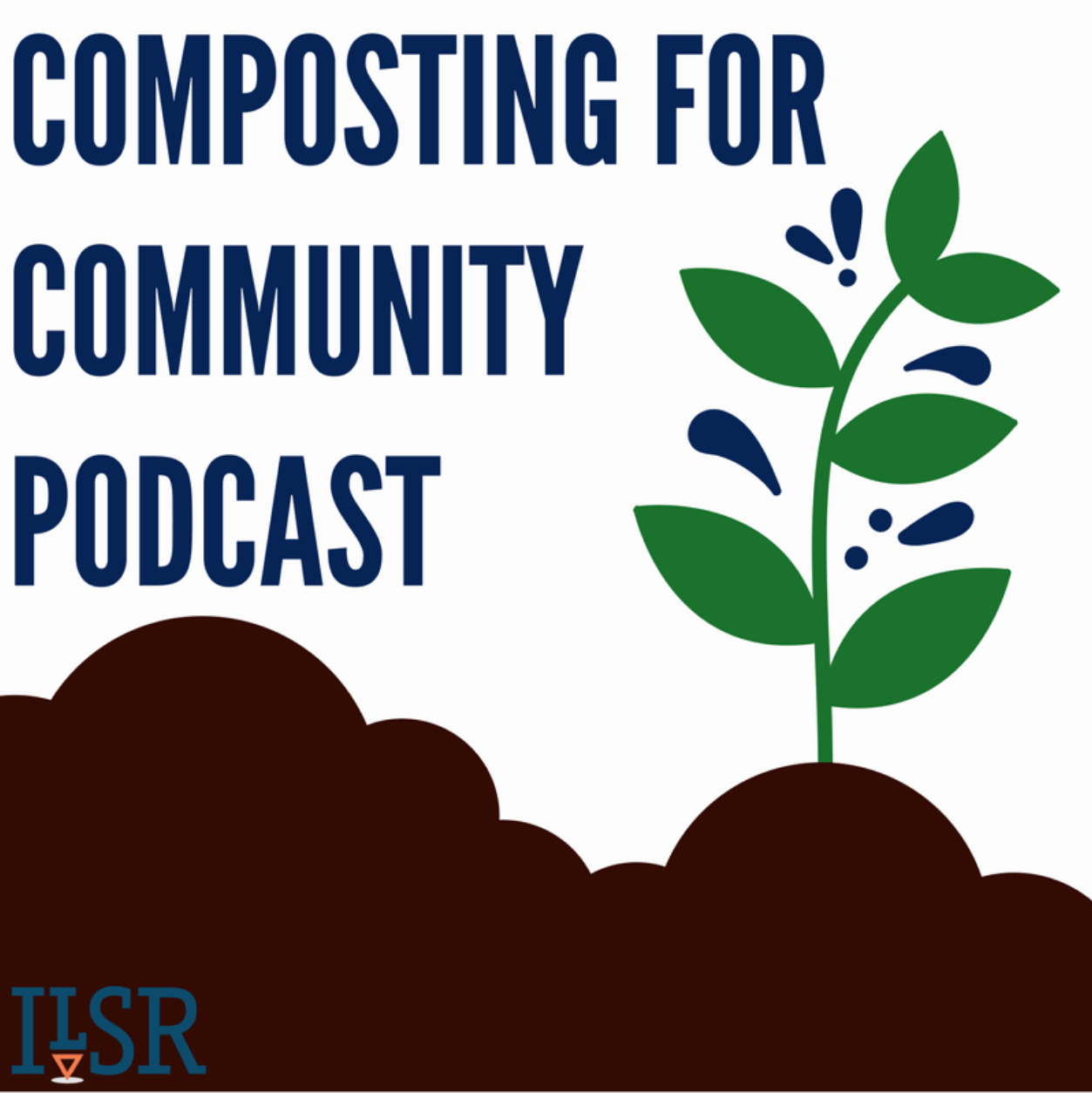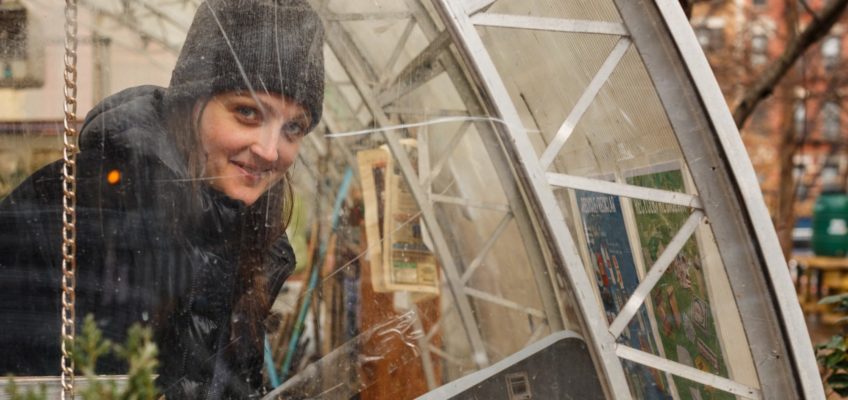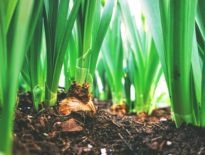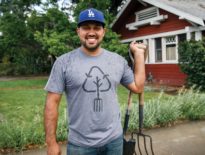Welcome back to the Composting for Community Podcast! On this episode, Host Linda Bilsens-Brolis is joined by Meredith Danberg-Ficarelli, Director of Common Ground Compost. They talk about how Common Ground Compost is helping businesses in NYC comply with local composting and recycling regulations and embrace Zero Waste. They also discuss:
- The role of community composting and micro-hauling in NYC’s waste management landscape
- Common Ground Compost’s multi-pronged consulting approach for working with businesses
- Meredith’s experience with composting and recycling in Beirut, Lebanon
- Common Ground Compost’s goals for growth and staff empowerment
- Advice for new composters
Listen to this episode, then check out more episodes of the Composting for Community Podcast.
We generate waste in communities, so we should process waste in communities. It’s something that all of us touch and it’s something that all of us have the potential to be able to engage with. I see community composting within the frame of reclaiming our power.
Podcast (composting-for-community): Play in new window | Download | Embed
Subscribe: RSS
| Linda Bilsens-Brolis: | Across the country. The community composting movement is growing small scale composting provides communities immediate opportunities for reducing waste, improving local soil, creating jobs and fighting climate change. You’re listening to the composting for community podcast where we’ll bring you stories from the people doing this work on the ground and in the soil to support this burgeoning movement. I will start as composting initiative, convenes a coalition of community composters from around the country. And beyond these next few episodes, feature interviews from our sixth national cultivating community composting forum in New York City. We talked to attendees about why community composting matters, how they are transforming the way their communities managed, their ways and advice they have for fellow composters.
So, we’re recording now from the sixth national cultivating community composting forum, which this year is happening in New York City. And with us now is Meredith Danberg-Ficarelli, did I say that right? You did. And she is a common ground compost. She is a local, uh, New York City community. Composter she’s also been an invaluable part of the, uh, steering committee for the community composter coalition for a number of years now. So we are very grateful that she’s joining us now. So say hello. Thanks, Linda. Hi everyone. So Meredith, uh, for our listeners who may not be familiar with common ground compost, uh, tell them a little bit about yourself. Uh, what common ground does and how composting fits in. |
| Meredith Danberg-Ficarelli: | Great. So I’m the director of common ground compost. We launched in 2014 and I joined the team in late 2015, um, as a part time staff person. And now I’m full time running the show. Uh, and we are a consulting company, um, that builds the composting and recycling programs for businesses in New York City. Focusing on food obviously, but what you find or what one finds when one is doing organics diversion work is that frequently recycling needs help too. So, um, at the, at the commercial scale and on the consulting side, we are doing education and training, waste auditing, um, developing new programs, standard operating procedures, helping people, um, find new contracts with waste haulers if needed. And really everything in between. Signage, infrastructure, color coding, um, you know, these systems need to be built properly if they’re going to work correctly. Um, and it, it takes work to put them in place and it takes, um, you know, a desire for transparency and, uh, motivating people to understand why they should want to divert materials from landfills.Um, so I’ll talk a little bit more about that in a second. Uh, our, our second program is a zero waste events program, um, which obviously focuses on events and diverting waste from landfill that’s being generated at events. And the big thing that we focus on there again, is education. Uh, having infrastructure in place so that people can put their waste in the right category. But that has to do with, um, individual interactions. So having people standing at the weigh stations who help people separate their waste, um, and the infrastructure, everything that has that comes with that. And our third program, and this is in no particular order, it’s just the way that I list them, um, is, are reclaimed organics, bike powered, compost pickup service. Uh, that again started in 2014. Um, and we, we launched just servicing small food businesses. Um, the smallest generators in the city are the ones that are least served by the commercial waste industry.
Uh, imagining of bucket as opposed to a 64 gallon container. A truck does not want to stop for a bucket or a bag. Uh, so micro hauling fits into that space and we’re servicing small food businesses and now also offices. So we launched a service, sort of a concierge white glove service where we are going into corporate offices and, and collecting material from individual tenants and corporate buildings. Um, we have a site, uh, it’s a school garden, um, in the East village of Manhattan, um, where we, we have a two phase composting process that uses Bokashi fermentation and then an above ground area and static pile ’em into four foot by four foot by three foot wooden bins, um, rat proof, heavily bins. Um, but we’ve been displaced from that site since October of 2018 by a fire in an adjacent building. Um, so we are currently working out of a shipping container on the street. Um, so if you drive on 11th street between First Avenue and avenue a, you will see a blue shipping container. Um, give it a pat. That’s where our care is. Um, and so we have also sort of expanded our operations into working more with commercial buildings, um, in order to sort of maintain our operation. Uh, so instead of processing on site, we’re working with a commercial waste hauler who picks up from us and takes our material to industrial compost sites around the city. |
| Linda Bilsens-Brolis: | So you guys are doing a lot, you’re taking a very comprehensive sort of holistic approach and you have exemplified being adaptive to your environment and things that come up. So I think that there’s a lot of lessons to be taken from that. How did you get into composting? |
| Meredith Danberg-Ficarelli: | I kind of fell into it. Um, I was, I was really lucky too when I was in Grad school studying, um, for a, a master’s in urban policy and sustainability management.
Um, I traveled to Beirut in Lebanon and I was very lucky to meet and learn from. I’m a composter and mechanical engineer and agriculturalist there. Um, and, uh, also working with a farm to table restaurant, they were really interested in trying to go zero waste and didn’t have anyone to shepherd the process. So I read a lot about how to do a waste audit, um, and what zero waste means, um, and helped them start that process. That was in the summer of 2011. Uh, and that, that’s sort of where it started. I recognized that, um, there’s a lot of food in our waste stream, uh, both edible food and inedible food, um, or food scraps. Um, and I came back to the city after that summer and just had sort of this like awakening of, wow, this is what I want to do. So. Wow. |
| Linda Bilsens-Brolis: | I’ve been wanting to ask you about your time in Lebanon. Uh, how would you say the waste situation in Lebanon differs from here in the u s or New York City specifically? |
| Meredith Danberg-Ficarelli: | There are, so there are differences and there are similarities. Um, major differences is, is looking at sort of, uh, you know, a developing versus industrialist economy perspective of how, how waste is handled logistically. Um, at the time. So in 2011 when I was there and through 2013, which is, you know, that was sort of the time that I spent there. Uh, there was one company that had a contract to collect all the waste, um, in those sort of Beirut metropolitan area. Um, so, you know, that’s a monopoly. Um, and there were large, uh, two yard metal containers in the streets, in parking spots. Uh, you know, anywhere from two to 10 of them lined up and everyone would bring their waste to those containers. Um, which one could argue could be a great system. Um, if, if there’s a system in place to offer something other than just a landfill.
Um, it all, it created or led to or fostered, um, uh, an informal economy, um, of repair economy. Um, a scat scavenger in air quotes, economy of pulling the value of materials out. So there were always people, which is dangerous, but there were always people either, you know, digging through or pulling out, um, plastic bottles and metal and potentially still functioning, um, appliances and other things, which one could argue happens here in New York City. So there’s a similarity, um, you know, differences. Sure. Um, you know, regulatory differences. Um, soon after I left Lebanon and in 2013, uh, there was a major are people that contract with that company ended and a new contract, uh, didn’t, there’s a lot of, there are a lot of political challenges and other things that led to this. Um, but, uh, the end result was that there was garbage in the streets. Um, no one was picking up the trash, so it was piling up. Um, and that is an incredibly unfortunate situation and a very, very large structural problems led to it. But, um, ones a silver lining is that it made recognize, um, not only the problems that they face with political corruption and societal challenges and, you know, inequality and all of these things. Um, but, but it also, I think, made people think twice about adding to the pile, um, how much, how, how much their individual consumption activities, um, uh, you know, how that aggregates. Um, so I think there was a lot of awareness around waste reduction and finding infrastructure, developing infrastructure and finding alternatives. Um, and there’s amazing work happening in Lebanon now. Um, the greenglass recycling initiative is focusing entirely on, um, improving, uh, sort of a dying glass blowing industry and doing reclamation of glass, which is a huge challenge even here. Um, there’s, there’s work being done on the organics front, um, on plastics diversion. Uh, there’s, there’s a lot happening and I think, um, that’s happening all over the world in, in cities everywhere, which is really exciting. Such an interesting case study. Yeah. So interesting to compare it to what we experienced here. Yeah. And it’s, you know, it builds out of, um, an individual or a group of individuals who, who have a mission and won’t stop. So, yeah. And they’re very invested in it. Yeah. Yes, yes. Personally, financially, politically, everything. Yeah. |
| Linda Bilsens-Brolis: | Awesome. So this is not your first time attending. One of these cultivating community composting forums. How many have you been to now? |
| Meredith Danberg-Ficarelli: | So LA was the first one, 2017, um, than Atlanta in 2018 and then Phoenix in 2019. So a year, a three year veteran. I am. |
| Linda Bilsens-Brolis: | What is it that has kept you coming back and has kept you involved in the coalition cause you also co lead the bike powered subgroup. |
| Meredith Danberg-Ficarelli: | So what keeps me coming back? Um, the people keep me coming back. The, the first conference that I had, the first forum that I came to was the Los Angeles one. I had never been to a US composting council conference. I had never been to, um, one of one of the cultivating community composting forums. And my colleague Laura Rosenshine, um, sort of encouraged me to do it and I didn’t know what to expect. I didn’t know anyone and I got in late and took a cab or whatever to the airbnb that, um, someone who had never met but was emailing with kind of organized and got there and very warm welcome to a 10 person airbnb with one bathroom. And I was like, this, all right, this is going to work. Um, they get to know each other day. Well, we did a yes and, and it was amazing.
Um, you know, we work in silos, which is a big challenge. A lot of, a lot of the time I try to recognize that I live in a bit of an echo chamber. Um, when you’re doing consulting work, you are providing a service to someone that wants you to be there. Um, so I have to check myself frequently and remember that, you know, um, uh, not all of my friends want to hear me talk about trash, like, um, so it’s, it’s pretty exciting to be in a place where, um, everyone is doing different work but, but towards a common goal, um, and in very different ways. So we have a lot to learn from each other, but there are so many parallels. Um, and seeing one of the things that I was most excited about for this year, um, was having seen the growth between 2017 and 2018 and 2019 running into some people at USCC when I was there. Um, in, in Phoenix, um, and recognizing that there were going to be even more people cause, um, New York City is great and there’s a lot happening here. Um, so, so seeing and learning, um, from others and, and recognizing the evolution of everyone’s programs. |
| Linda Bilsens-Brolis: | Awesome. And to clarify for our listeners, uh, so this is the sixth national cultivating community composting forum of first couple or hosted in conjunction with the bio cycle conference. Bio Cycle is still a great supporter of this event. Uh, the next couple, uh, two or three were hosted in conjunction with the u s composting council’s annual, uh, conference and trade show. But this year we’re really excited because this is the first time that we’re hosting a standalone event of 140 plus a community composters and people who support community composting in New York City and New York City seemed like such an appropriate place to launch that sort of stand alone, uh, you know, event just because of how much is going on here. And we had a date with four different types of tours that you could see sites in different parts of the city. I mean, there’s just so much going on here. |
| Meredith Danberg-Ficarelli: | Is this the most people we’ve ever had? |
| Linda Bilsens-Brolis: | Yeah, absolutely. I think by far, yeah. So very exciting. So if someone who didn’t really know what community composting was, how would you answer the question or how would you tell them? How would you explain it to them? What is community composting? |
| Meredith Danberg-Ficarelli: | So, community composting in New York City, um, happens at a lot of different scales. Um, and it can be, uh, you know, a self run worm bin under your sink and it can be, uh, a large sort of almost industrial scale facility under a bridge. Um, you know, run with city funding. So coming into the community composting world, you know, coming to the very first conference in La and in 2017, uh, I was coming from a perspective of, of understanding that all of these different scales existed, but not knowing what was happening in other places. Um, and learning about the, the work that’s being done from the, from the waste equity frame. Um, and from the social justice frame, um, was, was, uh, that was a new world for me. Um, as it relates to community composting, and it just makes so much sense. Um, because I see it the same way, um, but hadn’t really had those things defined before.
So the, I see, I see community composting is the same way that I see the potential for quote unquote waste, um, to be a resource, uh, organic especially, but all of our materials, we generate waste in communities. So we should process waste in communities. If we’re talking about, you know, the challenges of carbon emissions that are associated with transport, like why not focus on, you know, the sort of the end of the supply chain, um, first, uh, because it’s something that all of us touch and it’s something that all of us have the potential to be able to engage with. Um, as long as we’re given the tools and resources and as long as the infrastructure is available, you know, which is a structural challenge obviously. But, uh, so I see community composting within that frame of sort of reclaiming our power, if you will. |
| Linda Bilsens-Brolis: | Definitely. Yeah. I mean, I think the way that a community manages a waste is so it tells you so much about what’s going on in that community, how directly and intentionally they deal with. It just speaks volumes about maybe how it treats people. Um, and environment in general. So, so much to be learned. Um, and I love geeking out about waste if everybody here. Um, but food scraps are not organized. They’re not waste until they wasted. So that’s a way that we look at it at ILSR anyway. Maybe you could share with us what goals, top of mind goals you have for your business for this year. |
| Meredith Danberg-Ficarelli: | This year I’d love to break even. I’d love to get back into our site so that we can be processing again. A no longer have our team operating on. We shouldn’t continue on the street and we very much want to have our team employed full time. We’re not there yet, but we were getting there and it’s exciting to be engaging more and bringing, you know, bringing the team more into development conversations and conversations about growth and you know, the directions that we’re heading in. You know, we’re, we’re operating all of these different services. So understanding how each of those can grow independently of each other and how people can take ownership over those |
| Linda Bilsens-Brolis: | Those sound like good goals. Uh, any advice that you might share with anybody just getting started in composting? |
| Meredith Danberg-Ficarelli: | Talk to people. Uh, listen to podcasts. Um, I think that’s a good thing. Uh, read, read books and visit sites. Uh, but recognize that the people that you visit have a lot of work to do. You know, we, we want to share with each other and we want to lend our experience and our knowledge and I think it’s important to recognize that people need to do their work in addition to educating people about their work. So, you know, be sort of, um, selective in how you seek information. Right? Um, and respectful. Yes. It’s a balance. Yeah. Sharing and making sure people have time to take care of what they need to take care of. Right. So to close out, how can folks find out more about common ground campus? Common ground, compost.com on Instagram at, at Coleman compost. And we are always engaging with hopefully paid staff people, but sometimes volunteers at zero waste events.It’s a really good way to dive right into it. Um, you learn a lot by having to help people sort their waste and we always do a quick train beforehand to help people understand what’s what, um, cause who knows the difference between a compostable cup and a non-combustible cup and they both look the same, which is another huge problem. Um, we need better federal level regulations on what materials are used and other vantage and where they go and how they’re labeled. Not to digress there. Um, but yeah, looking forward to connecting with people. |
| Linda Bilsens-Brolis: | Awesome. Thank you Meredith. And thank you all for listening. |
| Meredith Danberg-Ficarelli: | Thanks |
| Linda Bilsens-Brolis: | Thanks so much for listening to this episode of the composting for community podcast from the Institute for Local Self Reliance. This episode is produced by myself and Hibba Meraay. We’ll be back again next month, with a new episode. Our theme music is, I dunno, from Grapes. Be sure to check out the rest of the ILSR podcast family, including Building Local Power, Local Energy Rules and Community Broadband Bits at ilsr.org |
Follow the Institute for Local Self-Reliance on Twitter and Facebook and Instagram. For monthly updates on our work, sign up for our ILSR general newsletter.
newsletter.
If you have show ideas or comments, please email us at info@ilsr.org.
Subscribe: iTunes | Android | RSS
Audio Credit: I Dunno by Grapes. Licensed under a Creative Commons Attribution Noncommercial (3.0) license.
Photo Credit: Jodie Taylor





